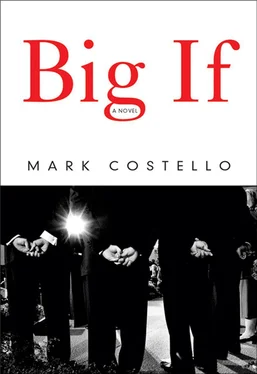Of the four boys throwing rocks, three went to Vietnam. Two came home, one with medals, one with legs, and this again — the boy with no medals and two legs — was Tashmo. He was in the Air Cav, ’68 and ’69. He saw true courage in Chu Lap and Ha Bong and decided that it wasn’t up his alley. He scammed his way through the rest of his tour as a chaplain’s aide, Spec 4. The chaplain was a brimstone Presbyterian from Texas. They toured the wounded tents together, passing out peppermints and reading from the Good Book. When the chaplain wasn’t looking, Tashmo charged the GIs two condoms for a dramatic reading. The soldiers loved his Fats Domino rendition of the Song of Solomon, Your breasts are like great goblets, your eyes are like great jewels, your arms are like great boughs, and your momma ain’t around. This was how he saved his legs in Vietnam.
He went to North Dakota State on the GI Bill, a twenty-two-year-old freshman, majoring in Business, English, Ag, Engineering, Ag again — he had more majors than the Army and they were about as relevant. He went to a football game in Grand Forks that November, State v. U, the homecoming. He sat next to a girl named Shirley Skurdahl, a one-in-fifty-thousand shot. They did the Wave and started chatting, and quickly realized that they had a lot in common. Shirl came from Blankenship, near Hebron, near Fort Scott, near Vercingetorix, which was only two exits from Falling Rock, which made them neighbors, nearly. They had grown up ninety miles and eighteen months apart, loving and believing the same things. They both thought the sideburned, ankle-booted racetrack impresarios were cool, the coolest, deliveries of cool from Californeeay, and even now, a lifetime and two daughters later, Tashmo was a version of these dudes, admittedly a pension-fully-vested, upper P.G. County, married-filing-jointly, no-thank-you-we’re-quite-happy-with-our-present-phone-provider version of these dudes, but still, he loved his suits and boots, his pool hall El Ranchero look, and he always would. Shirl loved it too and always would, but she didn’t understand that no one else loved the look, east of Forks, south of fifty. He had tried many times in the last few years to say or imply or insinuate that she didn’t need to worry when he went away, that he was finally faithful, finally settled, finally hers, but she wouldn’t let it go, this image of her husband as a stud. No woman wants a man no woman wants. She couldn’t see him as a relic of past futures, because what would that make her? Jealousy is vanity eventually, he thought.
Shirl ran the disposall. “Well I won’t say ugh .”
“ Aaa-guh . And don’t forget: leftward. Generoso needs to know.”
Generoso had fixed every car they had ever owned since the microbus with the little sink and faucets which connected to nothing and the manual in German, making the car care tips seem all the more achtungful. Tashmo didn’t like taking orders from the Krauts, and was never big on car care, which was probably why that piece of shit was always on the fritz. They drove it up to Philly for the Bicentennial and had to get it towed by this real witty black guy in an afro. Mandy was a baby, Ford was president, and Tashmo was a trainee agent, buried in Baltimore, the Crim Division, working for a special agent in charge who liked to cut out early and watch the Orioles take batting practice.
The SAC loved Tashmo. He said, “You’re a dude.”
The SAC was an embarrassment, the way he brought his mitt to the ballpark, clapping for a rally, a fist into the mitt, and used it as a megaphone, The ump is a chump! , and knocked the kids aside for the foul balls.
Tashmo begged for orders out of Baltimore and they sent him to Protection, Carter’s detail. He took Shirl and Mandy camping in the microbus to celebrate, a week in Valley Forge, where Mandy learned to walk. Tashmo was something of a history buff, a fool for dioramas and ugly observation decks. He was happy anywhere there was a gift shop selling tasseled pencils, which were much too big for the see-through pencil cases, which they also sold. Shirl called the microbus a “camper” after that, thinking micro made the bus sound both metric and injectable. They drove the camper/microbus to Gettysburg, Harpers Ferry, Appomattox, and all the way out to Mount Rushmore, where Shirl took his picture guarding the stone presidents in a Hawaiian shirt, but mostly they took it to Generoso, who probably fixed the microbus twenty-seven times before Tashmo finally sold it to an EPA ecologist for two-hundred dollars over Blue Book.
The ecologist claimed the bus one afternoon. He brought his wife, a tall gal named Anita. Her hair was glossy-black, straight to her ass, and she came from Winnipeg. As the husband looked for rust, Tashmo had a vision in his driveway. It came to him full-blown, as movies come to you in theaters. He saw Anita kneeling at his feet in a buckskin dress, offering him a platter of cool butter. He snuck around to the back of the microbus and stole the tire iron.
A few days passed. Carter was R&R’ing at Camp David and the detail was standing three-day rotating watches, pretty decent duty, watching Carter agonize, better than skiing with the crazy fucking Fords everybody said, except for the ticks in the woods, and the protest-hippies and photojournalists sneaking through the underbrush.
Tashmo was coming back from a rotation. He went by the ecologist’s. He knew that the wife was home. He saw her car, an orange Karmann Ghia, sitting in the driveway. He didn’t see the microbus. He figured the ecologist was off ecologizing. He rang the bell, spinning the tire iron in his hands, kicking at the welcome mat.
Anita opened up. She wore a long suede skirt, ferny green, a studded seam running up the outside of each thigh. He offered her the iron and started to explain.
She said, “Aren’t you nice?”
And he was. He would always think of that time, Carter into Reagan, as his suede phase, remembering Anita’s seam, her saddle-smelling thighs. Looking back, it seemed he spent those months commuting to Camp David, living in a bunkhouse, patrolling the dirt roads, watching Sadat take a chilly dip, then home again to Shirl, by way of Anita’s.
Camp David made him horny, everything about it — the goofy swimmin’ holes, the timbered dining halls, the motor court cabins done up in a thrift-store Happy Angler motif, like Mamie Eisenhower’s vision of an Adirondack Berchtesgarden. The point of the place was to Retreat, clear the head of leadership in the bosom of the woods, some F. Scott Thoreau — type jazz, but the woods were rigged with the latest anti-SigInt gear, microwave bafflers under underbrush, emitting the acyclic hum of a wounded engine. Tashmo walked the fences in boots and Wrangler jeans, slinging his sixteen just like in the war, always in long sleeves and slathered in bug lotion, because the woods were ticky, and if the ticks bit you, you got this thing called Lyme disease, which was basically old age except you caught it from a deer. Walking the woods at night, Tashmo heard the bafflers, but couldn’t always find them. The humming wavelength was designed to bounce between the trees and carry forever. The term was propagate , the techies said, the description of this bouncing, like in the Bible (he remembered Vietnam), and Abraham did propagate with Sarah , or like Russia, where they had propaganda instead of democracy. He tried to follow the hum, but he found himself walking in big circles, the moon between the trees, on his left, then on his right. The bafflers he couldn’t find made his dick stand up. Many times on lone patrols he had to lean against a tree and jerk off in the dark just to get his mind back on Jimmy Carter.
He spent a lot of time in the duty hut, drinking rotgut coffee with Lloyd Felker, filling out the logs, watching a wall of CCTV, surveillance cameras sweeping fences all night long. They had motion sensors, infrared, scanners tuned to wide array. They tracked possum for fun and watched Johnny Carson, the monologue and guests, the smutty banter from the couches. They tracked the protest hippies, the anti-nukers trying to infiltrate from the west, saw them coming miles in advance.
Читать дальше












